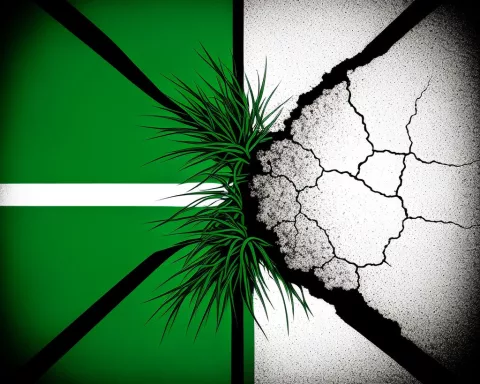South Africa’s recent VAT increase by 1% is stirring up strong feelings across the country. Critics say this tax hike will hit low-income families and the middle class the hardest, making life even tougher for those already struggling. While the government argues that the extra money will help pay for important services like health and education, many believe there are better ways to support people without adding to their financial burdens. Amidst this tough news, there is a bright spot: increased funding for early childhood education, which could help lift many families out of poverty and build a better future.
What are the implications of South Africa’s VAT increase?
The 1 percentage point VAT increase in South Africa is expected to disproportionately affect low-income households and the middle class, exacerbating existing financial strains. Critics argue for alternative solutions to support essential services without burdening vulnerable populations. The increase may also hinder economic growth and investment.
A Controversial Tax Hike
In a significant move that has stirred economic and social concerns across South Africa, Minister of Finance Enoch Godongwana declared a 1 percentage point increase in the Value-Added Tax (VAT) for the upcoming two financial years. This announcement has sparked a wave of criticism, particularly from the Western Cape, where residents and officials feel the impact will be most severe on the poor and working classes.
Premier of the Western Cape, Alan Winde, voiced strong objections, suggesting the budget should not rely on a VAT increase. He criticized the national government for failing to make tough decisions at the beginning of its term, arguing that this approach unfairly burdens the most vulnerable sections of society. Winde’s comments reflect a broader sentiment among local officials who advocate for a more equitable fiscal strategy.
Winde stressed the importance of early governmental decision-making, proposing that salary increases for government employees should not exceed the inflation rate. He emphasized the need to reduce the number of State-Owned Enterprises (SOEs) and curb corruption, which he described as a crippling force on the country. These remarks underscore a call for systemic changes in South Africa’s fiscal policies.
Broader Economic Repercussions
Echoing Premier Winde’s concerns, Western Cape Minister of Finance Deidré Baartman labeled the VAT hike as “unconscionable” amid already harsh financial conditions for households. Baartman questioned the rationale behind the tax increase, noting that while it aims to fund essential services like health and education, it disproportionately affects the poor and middle-class. She urged the government to explore alternative solutions that wouldn’t exacerbate the financial burden on taxpayers.
Beyond the Western Cape, the Beer Association of South Africa (BASA) also expressed dissatisfaction with the decision. BASA CEO Charlene Louw highlighted a 6.75% hike in Excise Duties, warning that such increases could stifle growth and job creation in the beer industry, a vital component of South Africa’s economy. Louw pointed out that raising excise taxes above inflation, coupled with the VAT increase, places a significant financial strain on both businesses and consumers. She called for a more balanced tax approach that considers the realities of industry growth.
Further complicating the economic landscape, Deal Leaders International CE Corporate and Advisory Andrew Bahlmann noted that although corporate income tax remained unchanged, South Africa’s high corporate tax burden continues to deter foreign direct investment (FDI). Bahlmann highlighted a troubling 28% decline in mining sector receipts, calling for tighter control on government spending, projected to rise annually above inflation by 5.6% over the next few years. His comments underline the necessity for fiscal prudence to attract and retain investment.
Mixed Reactions and Historical Context
Contrary to the widespread criticism, some sectors found positive elements in the recent budget. The Western Cape Commissioner for Children (WCCC) and her Child Government Monitors (CGMs) welcomed the allocations made by Minister Godongwana in the 2025/2026 budget. They appreciated the additional R10 billion set aside over the medium term to increase the Early Childhood Development (ECD) subsidy from R17 to R24 per day per child. This increase is expected to benefit approximately 700,000 more children, enhancing access to quality education and offering a glimmer of hope amid financial challenges.
The broader historical context of tax policies reveals that the balancing act of funding essential services without stifling economic growth or disproportionately affecting certain groups is nothing new. Debates surrounding taxation have been a constant, from the progressive models of the early 20th century to the regressive sales taxes that often burden the less affluent. This historical perspective underscores the enduring complexity of creating fair and effective tax policies.
Artists and writers have long explored the nuances of taxation and economic policies. Charles Dickens, through his portrayal of Victorian England in “A Tale of Two Cities,” highlighted the disparities exacerbated by economic decisions. Similar parallels can be drawn to modern-day South Africa, where fiscal policies have far-reaching consequences on everyday life. Premier Winde’s call to reduce SOEs reflects a broader sentiment for efficient and transparent governance, a theme echoed throughout history.
Path Forward: Balancing Fiscal Responsibility and Social Equity
The VAT increase must be examined within the context of South Africa’s broader economic commitments, including fostering both domestic and foreign investments. High taxation rates, as highlighted by Andrew Bahlmann, can deter potential investors, impacting job creation and economic growth. The significant decline in receipts from the mining sector, a cornerstone of South Africa’s economy, amplifies the need for prudent fiscal management.
In the realm of arts and literature, economic landscapes often serve as a backdrop for creativity and social commentary. The Harlem Renaissance, for instance, emerged during the economic struggles of the Great Depression, providing a voice to the African American experience. Similarly, South African artists and writers have documented the social and economic challenges faced by their communities, advocating for change and highlighting injustices through their work.
Despite the financial turmoil, the increase in Early Childhood Development (ECD) subsidies offers a beacon of hope. Early childhood education is a critical investment in the future, shaping the next generation’s skills and capabilities. By improving access to quality education, South Africa can potentially uplift entire communities, breaking the cycle of poverty and fostering a more equitable society.
In conclusion, Finance Minister Godongwana’s recent budget decisions have ignited a complex web of reactions, emphasizing the multifaceted nature of economic policy and its profound societal impact. While the VAT increase poses immediate challenges, particularly for the poor and middle-class, the positive strides in education funding provide a glimpse of progress. Balancing fiscal responsibility with social equity remains a delicate but essential task for South Africa’s future.
FAQ on South Africa’s VAT Increase and Its Implications
What is the recent change in South Africa’s VAT?
The recent change in South Africa’s Value-Added Tax (VAT) is a 1 percentage point increase, as announced by Finance Minister Enoch Godongwana. This increase is planned to last for the upcoming two financial years.
Who is primarily affected by the VAT increase?
The VAT increase is expected to disproportionately impact low-income households and the middle class, exacerbating existing financial strains. Critics argue that this tax hike will make life even tougher for those already struggling under economic pressure.
What are the government’s reasons for increasing VAT?
The government argues that the additional revenue generated from the VAT increase will be used to fund essential services such as health and education, which are critical for societal development. However, many believe there are more equitable ways to support these services without burdening vulnerable populations.
What are the broader economic implications of this tax hike?
Critics, including local officials and industry representatives, warn that the VAT increase may hinder economic growth and investment. The Beer Association of South Africa has expressed concerns that it could stifle growth and job creation in the beverage industry, which is significant for the economy. Additionally, high corporate tax rates are already deterring foreign direct investment.
Is there any positive aspect to the recent budget announcements?
Yes, a notable positive aspect is the increased funding for Early Childhood Development (ECD). The budget allocates an additional R10 billion over the medium term to increase the ECD subsidy from R17 to R24 per day per child, which is expected to benefit around 700,000 more children and improve access to quality education.
How have historical tax policies influenced current debates on VAT?
The debates surrounding tax policies in South Africa echo historical discussions about balancing funding for essential services while avoiding disproportionate burdens on less affluent populations. From progressive tax models to regressive sales taxes, the complexities of creating fair and effective tax policies have persisted throughout history, influencing modern-day fiscal strategies and public sentiment.












